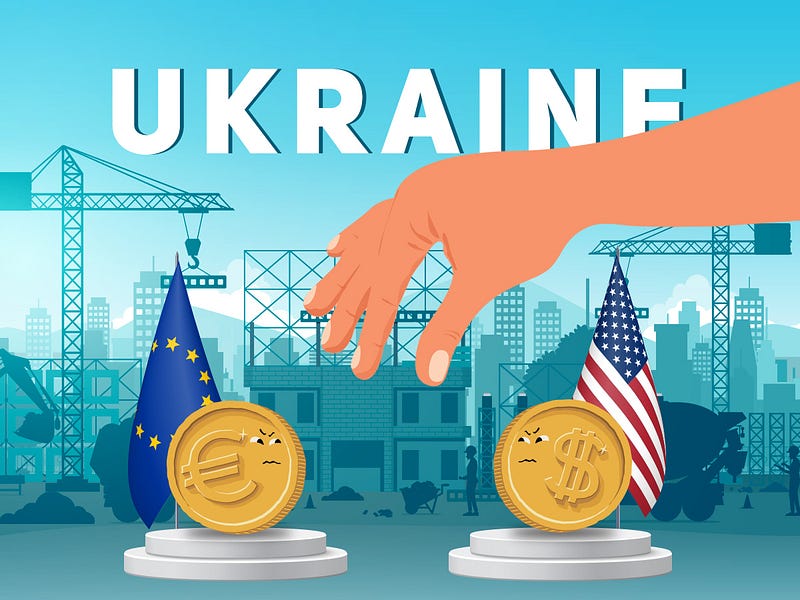
As Russia’s war machine seems to be losing its dynamism, more and more Ukrainians who were forced to flee the war and seek refuge in western Ukraine or in foreign countries, are returning home. I cannot help but I associate this with the fact that, over time, more and more speculations are emerging about the state of health of Vladimir Putin. Since the first day of the war, Ukraine has been steadfastly supported both in political and financial terms by the Western bloc, which, at the same time, has imposed severe sanctions on Russia.
As for the post-war reconstruction of Ukraine, Western support is a key issue, even though the military actions have not ended yet, and it is impossible to predict when peace will return to the country. The question of reconstruction is closely linked to Ukraine’s possible EU membership, which, not by chance, seems to be the most important goal of president Zelenskiy.
Some experts estimate the cost of post-war reconstruction of Ukraine between € 200 billion and € 500 billion. But who could say exactly how much it would cost to rebuild a war-torn country? The physical damage to infrastructure alone was deemed to amount to € 60 billion by the World Bank in April.
So, the question is not only how much the recovery will cost, but it is also important who will finance it, who will provide the loans, and what type and extent of influence will the creditor have over Ukraine?
As for the latter issue, it should be noted that it was mainly Ukraine’s military infrastructure which has been destroyed, and the reconstruction of military infrastructure is a top priority in rebuilding defence capabilites — this is an obvious requirement of a sovereign country, and this is an essential national interest and also a relevant matter of national security. This is the kind of infrastructure which construction or reconstruction should not be outsourced to foreign investors. Will anything be different in Ukraine this time? And if Russia will be in a position to have its say on this issue, what its reaction would like to be?
But let’s put aside for a while the complicated problems of financing the recovery of Ukraine’s military infrastructure, and let’s see from which sources Ukraine can receive funding for the reconstruction of its civilian infrastructure.
Taking into account that the EU’s long-term budget for the period 2021–2027 was adopted long before the war, the solution may be tricky. Although the European bloc has several programme budgets to finance emergency spending, these figures are very different from the amount that would be required to rebuild a whole country from its ruins and restart its collapsed economy. Nevertheless, I believe, that the member states will not hesitate to vote for a gigantic aid to Ukraine. The European Commission has already started drawing up a post-war recovery plan for Ukraine. In my opinion, the proper question sounds like this: by providing such a gigantic aid, does Brussels really want to definitively and irreversibly draw in its orbit Ukraine, which is unlikely to ever be a net contributor but has a population of 40 million — a mass of people which should be fed by Europe and, which will soon flood the European labour market.
In case the full-scale reconstruction of Ukraine cannot be financed from the common EU budget, still there is the option of contributions of single member states. However, after the member states, for the sake of Ukraine, voluntarily decided to part with Russian energy resources, which resulted in significant extra expenditures, it would be quite unreasoning to expect them to also ensure the funding of Ukraine’s recovery. European states undoubtably have already made huge commitments to help Ukraine at international donor conferences.
Acting as Ukraine’s benefactor, the U.S. is likely to embark in Ukraine’s reconstruction, because that could bring them huge benefits — not only can it boost the economy, but Washington can also gain significant political influence by such enormous investments. Following a $60 billion aid, U.S. Senate has recently approved another $40 billion aid package for Ukraine. I am sure that, in addition to the United States, or even together with the States, Poland will also soon come forward and offer its help as a talented town-planner, inspired and guided by very similar economic and foreign policy motives and goals.
According to a number of western political actors and analysts the transfer of the Russian Central Bank’s frozen foreign exchange reserves and the oligarchs money to Ukraine would contribute to financing Ukraine’s reconstruction. Around € 300 billion in Russian reserves are currently frozen in the U.S. an EU. I have just one comment on this. It should not be forgotten that Russian oligarchs, just like the Ukrainian ones, stole their money from their country and from their people, and it was this stolen money which was deposited on foreign accounts. In your opinion, would it be ethical to rebuild Ukraine on this money? Should not we first ask the Ukrainian oligarchs for a voluntary financial contribution?
The idea of a European Marshall Aid to Ukraine has already been articulated several times. Neither Brussels nor the U.S. is against such a plan. Let it be a European or an American initiative, it is worth recalling the real purpose of the initial Marshall Aid provided by the United States to war-torn Western European countries between 1948 and 1952, namely to increase the influence on Europe, and it is no longer so unambiguous to say whether it would be beneficial for Ukraine to accept this kind of help from the European Union. The only question is whether Kyiv will have any other choice?
Leave a Reply